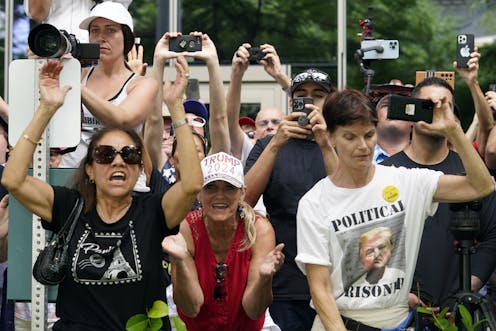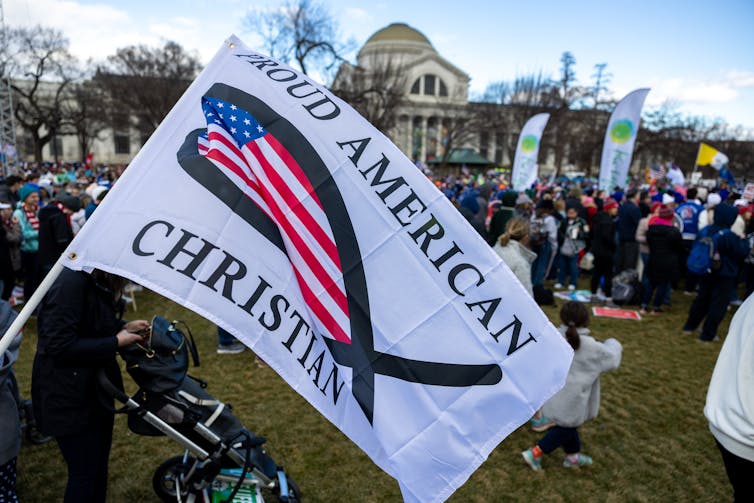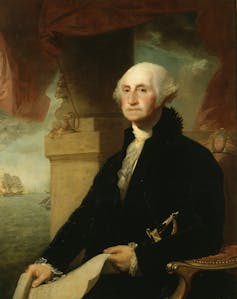
“The personal is political!” is a well-known rallying cry, originally used by left-leaning activists, including feminists, to emphasize the role of government in personal lives and systemic oppression.
It seems that now, it could be equally popular among right-wing politicians and their followers to communicate the idea that “everything is political.”
Nowhere is this more evident than in the case of former President Donald Trump’s recent indictment by the Department of Justice. Trump supporters say that the decision to charge Trump was “political.” If the department hadn’t charged Trump, that decision would likely have been seen by others as “political.”
In both cases, the critics would have meant that the prosecutors’ decision was influenced by partisan bias, based on whether the decision was good or bad for the Republican or Democratic party. U.S. Supreme Court decisions are often criticized as “political.” So are actions taken by election officials, scientific findings, and even topics taught in school.
As a professor of political philosophy, I worry that when both elected officials and citizens use the word “political” to accuse others of partisan bias, it means people no longer understand the distinctions between political and partisan, or public and private, which are vital to liberal democracy.
The preservation of such distinctions is crucial to rejecting less democratic and more authoritarian forms of government – including fascism.

What is liberal democracy?
In political philosophy terms, the United States is a liberal democracy.
Liberal democracy comes in multiple forms ranging from constitutional monarchies – such as the United Kingdom – to republics, such as the United States.
Although no democracy achieves the ideals of liberalism perfectly, under liberal democratic governments, citizens have rights and private lives protected from the actions of government. For example, in the U.S. it is inappropriate for legislation to be crafted based on a religious belief, even if some particular belief or sect is privately endorsed by a majority of citizens.
One way to view the purpose of a liberal democracy is to preserve and nurture the right of every citizen to have a private life independent of the government. In that private life, citizens pursue their own goals and develop connections, associations and activities that are of personal value.
Separate from that private life is the public arena, in which citizens come together to discuss and decide issues of common concern, such as national defense, economic policy and other issues that affect everyone. This is the world of elections, of legislatures, courts and officials.
People with divergent, or even very similar, personal lives could have different views on how to handle matters of public concern. But they can work together to rise above their differences to arrive at solutions to collective problems that benefit society as a whole.
A good example of this is the institution and funding of public educational systems, civil services and public parks, to help ensure every citizen has at least a minimum level of access to goods and services necessary for a healthy private and civic life.
The rise of politics
The philosopher Aristotle described humans as political animals, meaning that we depend upon the formation of cooperative political structures in order to flourish as human beings.
This human need for support networks that allow for mutual cooperation over time is the genesis of politics. In this sense, the concept of politics transcends more narrow partisan affiliations.
Political parties are just one aspect of political development – one, in fact, that George Washington warned against in his farewell address – that begins to blur the line between the public good of politics and narrower group interests.

Some of my own work pertains to how people’s commitments to partisan identity undermine their ability to understand scientific issues of public concern, such as human-caused climate change, and influence the spread of disinformation.
Lurking fascism
As partisanship gains momentum, citizens and elected representatives alike become less likely to constructively engage with those they disagree with. People who differ on issues come to see each other as threats to their own private values.
Government power begins to be used not in service to the citizenry at large, but as a tool of narrow interest groups. This is where people begin to advocate for legislation defining marriage, reproductive rights and other issues in ways that reflect narrow private and religious values.
Whereas “the personal is the political” was originally meant to flag ways in which government decisions unfairly affect and define personal lives, the mindset that “everything is political” creates a situation of perpetual conflict between divergent groups.
That’s the opposite of what politics is for and what a liberal democracy does: A liberal democracy specifically guards against using government power to further the agendas of distinctive groups. It seeks to prevent government encroachment into the private lives of individuals, and vice versa, in order to constrain the worst impulses of politicians and citizens alike.
Fascism, by contrast, seeks to make government power an aspect of every dimension of its citizens’ lives. Nazi apologist Carl Schmitt conceptualized politics as an all-consuming and literal life and death struggle between friends and enemies.
Partisan dysfunction
The current state of polarization in the U.S. highlights the problems that arise when liberal democracy’s division between private and public realms disappears.
Trump has posed many challenges for the United States’ constitutional democracy – not least the Jan. 6, 2021, insurrection. His current situation is another. There is no constitutional obstacle preventing him from running, or serving, as president even if he is found guilty of some of the charges against him, not even if he is sentenced to prison.
Nevertheless, the practical obstacles to serving as president while in a prison are obvious. Even someone who agrees with Trump’s views on key issues can recognize the challenges an incarcerated president would face.
If the nation were less polarized, less focused on winning or losing the power to impose regulations on Americans’ private lives, lawmakers and the public might equally prioritize avoiding such an obvious problem. They’d seek to preserve the rule of law in a way that would benefit the nation as a whole.
But they haven’t. Instead, Trump supporters will dismiss his indictments as “political” maneuvers intended to influence the balance of power in the U.S. government, rather than as necessary checks on abuses of that power.
And if Trump is eventually cleared of the charges, or avoids a prison term if convicted, I believe his critics will view those developments as a product of politics, of the struggle for power, rather than the operation of a deliberative justice system.
Shifting perspectives
As political partisanship takes hold, citizens come to trust only those institutions that are run by members of their favored party. They no longer engage in the work of democracy and do not seek to ensure that independent, democracy-wide systems and institutions are protected from partisanship.
Rather than a means to living together peacefully, politics is treated as a contest between combatants. Government institutions meant to serve all are treated as if they are inevitably capable of only serving a particular few – and the struggle begins over which few they are to serve.
I don’t know what the full solution to this problem is, but I believe one step in the right direction is for people to identify themselves more as supporters of liberal democracy itself than as members of, or backers of, any particular partisan political party.
Lawrence Torcello does not work for, consult, own shares in or receive funding from any company or organization that would benefit from this article, and has disclosed no relevant affiliations beyond their academic appointment.
This article was originally published on The Conversation. Read the original article.







